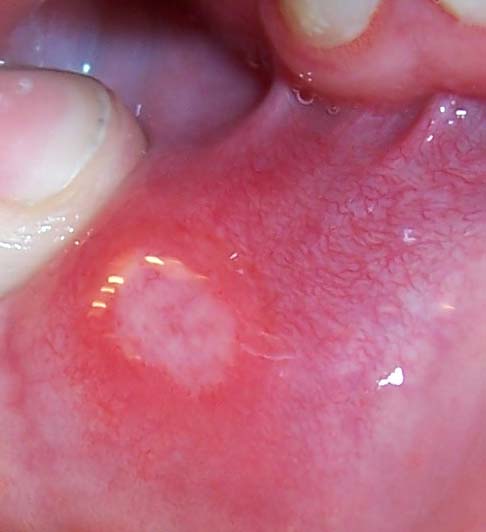Causes:
Aphthous ulcers, also known as canker sores, are small, painful lesions that form on the soft tissues inside the mouth, such as the inner cheeks, lips, tongue, and throat. The exact cause of aphthous ulcers is not fully understood, but factors such as stress, injury to the mouth tissues, hormonal changes, food sensitivities, and certain medical conditions like autoimmune disorders may contribute to their development.
Signs and Symptoms:
The most common symptom of aphthous ulcers is the presence of painful, round or oval-shaped sores inside the mouth. These ulcers are usually white or yellowish with a red border and can vary in size from a few millimeters to several centimeters. Other symptoms may include a burning or tingling sensation before the ulcer appears, difficulty eating or speaking, and swollen lymph nodes near the affected area.
Diagnosis:
Aphthous ulcers are typically diagnosed based on the appearance of the lesions and the patient's medical history. In some cases, a healthcare provider may perform additional tests, such as a biopsy or blood tests, to rule out other possible causes or underlying conditions.
Treatment:
Most aphthous ulcers heal on their own within one to two weeks without any treatment. However, to alleviate pain and promote healing, various home remedies and over-the-counter treatments can be used, including topical numbing agents, mouthwashes, and oral pain relievers. In cases of severe or recurrent aphthous ulcers, a healthcare provider may prescribe corticosteroids, immunomodulatory drugs, or other medications to reduce inflammation and suppress the immune response.
Prevention:
While it may not be possible to prevent all cases of aphthous ulcers, certain lifestyle changes and strategies can help reduce the frequency and severity of outbreaks. These include practicing good oral hygiene, avoiding foods that may trigger ulcers (such as acidic or spicy foods), managing stress levels, and avoiding injury to the mouth tissues.
Complications:
In most cases, aphthous ulcers resolve without complications. However, if the ulcers are large, persistent, or accompanied by other symptoms, they may indicate an underlying medical condition that requires further evaluation and treatment. Complications such as bacterial infections, scarring, or difficulty eating and speaking may occur in rare cases.
In summary, aphthous ulcers are common oral lesions characterized by painful sores inside the mouth. While the exact cause is unclear, various factors may contribute to their development. Treatment aims to relieve symptoms and promote healing, and preventive measures can help reduce the frequency and severity of outbreaks. If you experience persistent or severe ulcers, it is essential to consult a healthcare provider for proper diagnosis and management.

